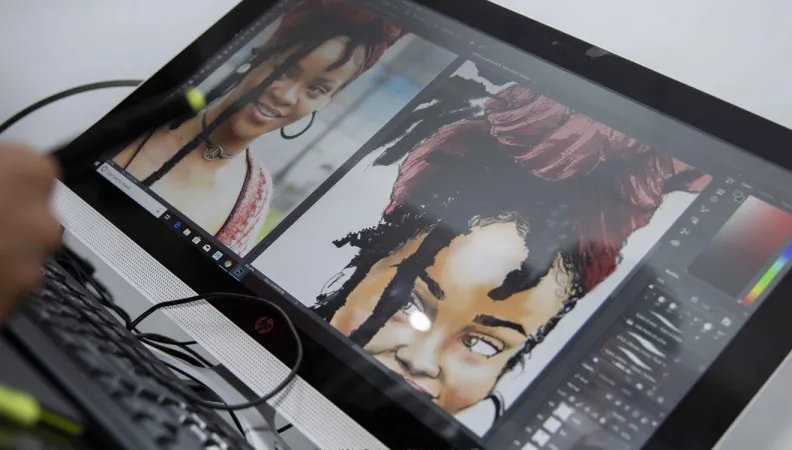Share the page
"Cultural and Creative Industries Promote Employment and Social Cohesion"
Published on

On October 6-8 in Paris, the first Création Africa forum for cultural and creative industries (CCI) will feature fast-growing sectors such as TV series, animation, video games, and comics. How does AFD Group support industry professionals and help new talent emerge? We find out.
Two years after the New Africa-France Summit in Montpellier, which focused on African youth and civil society, the Création Africa forum is helping strengthen the partnership between Africa and France by promoting artists, creators, and producers.
Gaëlle Mareuge, in charge of the Cultural and Creative Industries (CCI) mission at AFD, tells us more about AFD Group's activities in the sector.
AFD's Cultural and Creative Industries (CCI) mission dates back to 2018. What developments have you seen since then and what are AFD's main initiatives in the CCI field?
Gaelle Mareuge: AFD Group is currently active in virtually all CCI disciplines, from audiovisual and live performance to publishing, digital technology, cultural heritage, and museums. The Mayibuye project, which was presented at the Création Africa forum in Paris, uses digital technology to showcase part of South Africa's heritage, the Robben Island archives.
See also: Exploring History, Heritage and Culture in Southern Africa
In 2016, the Cicid (Interministerial Committee on International Cooperation for Development) asked AFD to consider integrating CCIs into its mission, insofar as the UN's 2030 Agenda recognizes culture as "a cross-cutting issue for the Sustainable Development Goals (SDGs)". Since 2018, we have therefore been working to structure and give momentum to CCIs along four main lines: cultural infrastructure and facilities, professional training courses for cultural professions, cultural entrepreneurship, cultural policies and governance.
The main development since 2018 is the adoption of AFD's 100% Social Cohesion strategy, which incorporates CCIs as a powerful vehicle for social cohesion. In addition to generating economic growth and jobs, CCIs promote social cohesion and integration, notably through intercultural and intergenerational dialogue. This is an essential sector for young people and women and, more generally, for reducing multi-faceted inequalities.
Today, our aim is obviously to continue supporting CCI projects, but also to mainstream CCI throughout AFD's portfolio.
Is it possible to "mainstream" CCIs, i.e. integrate them into projects that aren't necessarily cultural in the first place?
Yes, the idea is no longer to work solely on 100% CCI projects, but to integrate CCI components or activities into broader initiatives carried out by our technical divisions and local agencies in liaison with our beneficiaries.
As part of the urban regeneration and heritage project for the Lahore fort and surrounding area in Pakistan, for example, a museum has been created on the history and culture of the site.
Another example: I-Dice, a vocational training course in Nigeria, where we are integrating an ICC component, developing an e-learning platform and supporting creative hubs (including audiovisual, gaming and animation).
See also: AFD's latest Cultural and creative industries activity report
The Création Africa forum focuses on these themes (audiovisual, AI, and gaming), as well as on comics. What has AFD supported in these areas?
When it comes to comics, AFD was able to help fund the Bilili BD Festival in 2020, an annual event bringing together local and international authors in Brazzaville, Congo, and we are now helping launch the Brazzaville African Comics Documentation Center.
In the animation and gaming sector, since 2019 we have been supporting the Africa Digital Media Institute (ADMI) in Nairobi, Kenya, which offers professional training courses in this field in partnership with the French animation school Rubika. To date, 78 students have been trained. There will be more than 120 by the end of the project in 2024.
In South Africa, in partnership with Tshimologong Digital Innovation Precinct, the Digital Content Hub project is also very exciting. It's a hub dedicated to digital creation, combining African and French expertise to meet the continent's needs in terms of skills development, project and business incubation, content production, and market access.
As part of our Accès Culture, program, we have funded the "Restitutions partagées" (Shared Restitutions) project in Mali, which uses the spectacular immersive technology of virtual reality to popularize Africa's heritage culture. In particular, a 3D film on transmission using Yaya Coulibaly's puppets was produced.
Finally, in Senegal, AFD supports professional training courses in audiovisual professions by funding Kourtrajmé Dakar in partnership with Ina, for writing and directing, Cinékap, in partnership with Lafaaac, for production, and the Yennenga Center, in partnership with CinéFabrique, for post-production. And we'll soon be launching a project to support the professionalization of existing centers, as well as institutionalizing funding for training courses at CCIs and encouraging diversification of the disciplines represented.
It's a good example of our overall approach: we try to scale up and sustain the initiatives we fund by listening to the needs of cultural stakeholders and working hand-in-hand with local institutions.
